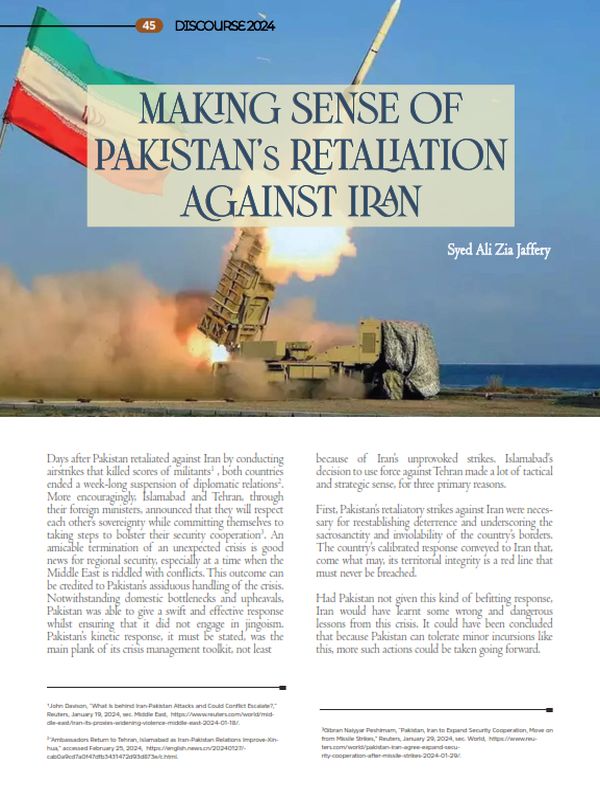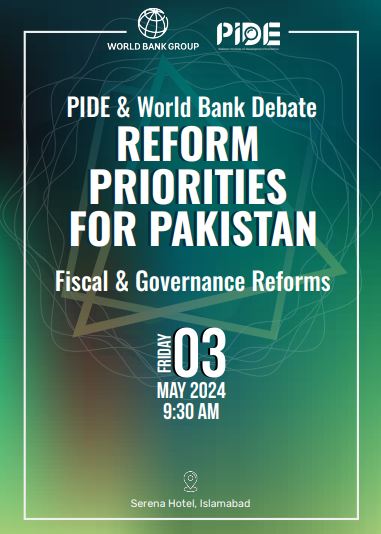Making Sense of Pakistan’s Retaliation Against Iran
Days after Pakistan retaliated against Iran by conducting airstrikes that killed scores of militants[1], both countries ended a week-long suspension of diplomatic relations[2]. More encouragingly, Islamabad and Tehran, through their foreign ministers, announced that they will respect each other’s sovereignty while committing themselves to taking steps to bolster their security cooperation[3]. An amicable termination of an unexpected crisis is good news for regional security, especially at a time when the Middle East is riddled with conflicts. This outcome can be credited to Pakistan’s assiduous handling of the crisis. Notwithstanding domestic bottlenecks and upheavals, Pakistan was able to give a swift and effective response whilst ensuring that it did not engage in jingoism. Pakistan’s kinetic response, it must be stated, was the main plank of its crisis management toolkit, not least because of Iran’s unprovoked strikes. Islamabad’s decision to use force against Tehran made a lot of tactical and strategic sense, for three primary reasons.
First, Pakistan’s retaliatory strikes against Iran were necessary for reestablishing deterrence and underscoring the sacrosanctity and inviolability of the country’s borders. The country’s calibrated response conveyed to Iran that, come what may, its territorial integrity is a red line that must never be breached. Had Pakistan not given this kind of befitting response, Iran would have learnt some wrong and dangerous lessons from this crisis. It could have been concluded that because Pakistan can tolerate minor incursions like this, more such actions could be taken going forward. More importantly, Iran could have calculated that it is a propitious time to aggress against Pakistan, not least because the country is weak from within. Here, it is important to mention that a lackadaisical response from Pakistan would have engendered reputational costs for it. When facing multiple inimical forces who want to carry out similar attacks, these reputational costs cannot be ignored. India, a country that has already carried out airstrikes inside Pakistan, would have been encouraged had Iran gone scot-free. Hence, it could be argued that Pakistan’s retaliatory strikes delivered the same message to multiple audiences, including the Indian leadership that has repeatedly threatened to carry out such attacks against Pakistan.
Second, an unremitting spell of escalation between the two countries would have been damaging for Pakistan because its political and economic woes do not leave any room for further instability. The country has been in the grip of major political and constitutional crises since the ouster of Imran Khan from office in April 2022. His rising popularity[4], coupled with an economy in tatters[5], saw a disgruntled citizenry up against a political dispensation that lacked credibility and constitutional backing. Therefore, with this conflagration taking place weeks ahead of the general election, Pakistan could not have afforded to let the situation simmer. Given how Khan’s victory in the election had been undermined and led to chaos[6], it is somewhat comforting that tensions with Iran have reduced. It would have been exceedingly difficult for Pakistani authorities to navigate volatility on the Pak-Iran border in the midst of countrywide protests against rigging. Additionally, had the crisis not terminated this quickly, one might have witnessed many rounds of skirmishes between the two countries. Such a scenario would have added more pressure on Pakistan to up the ante against Iran, making crisis management all the more complex. If anything, an unpopular political setup would have had its work cut out had the situation worsened. Therefore, it was important for Pakistan to show timely resolve, responsibility, and restraint, with a view to convincing Iran that further escalation would be costly.
Third, a militarily-active Pak-Iran border would have dented Pakistan’s chances of taking advantage of the opportunities that the China-brokered Saudi-Iran deal brings to the table. Certainly, if normalcy were to replace animosity in Tehran-Riyadh relations, Islamabad can find geoeconomic space for itself. Also, the country could benefit from the centrality of the China-Pakistan Economic Corridor (CPEC) in China’s Belt and Road Initiative (BRI)[7]. This, when coupled with China’s highly touted strategic deal with Iran[8], as well as the complementarity between Saudi Arabia’s Vision 2030 and BRI[9], opens up many strategic pathways for Pakistan’s economic turnaround. Moreover, if Saudi Arabia and Iran improve and strengthen their ties, the all-important Persian Gulf will become more stable, giving Pakistan unhindered access to oil, liquefied natural gas (LNG) and remittances. Therefore, it is reasonable to argue that had Pakistan allowed Iran to become more brazen and the row to continue, it might have taken a long time to capitalise on these strategic openings.
In sum, Pakistan’s measured yet resolute response to the recent border crisis with Iran was a strategic necessity. Foremost, Pakistan’s inability to retaliate timely and reinforce red lines would have signaled vulnerability, setting a dangerous precedent for other hostile forces, especially India. Moreover, an elongated crisis with Iran would have been difficult to manage, not least because of a bevy of domestic political and economic challenges that Pakistan faces. Last but not least, Pakistan being at loggerheads with Iran would have attenuated the prospect of taking strategic advantage of the openings available in the wake of the China-driven Saudi-Iran rapprochement. That these costs are too prohibitive is one reason why both Islamabad and Tehran have agreed to resolve their tactical issues cordially.
The author is the Deputy Director at the Center for Security, Strategy and Policy Research (CSSPR), University of Lahore. He can be reached on X at @syedalizia1992.
[1] John Davison, “What Is behind Iran-Pakistan Attacks and Could Conflict Escalate?,” Reuters, January 19, 2024, sec. Middle East, https://www.reuters.com/world/middle-east/iran-its-proxies-widening-violence-middle-east-2024-01-18/.
[2] “Ambassadors Return to Tehran, Islamabad as Iran-Pakistan Relations Improve-Xinhua,” accessed February 25, 2024, https://english.news.cn/20240127/cab0a9cd7a0f47dfb3431472d93d873e/c.html.
[3] Gibran Naiyyar Peshimam, “Pakistan, Iran to Expand Security Cooperation, Move on from Missile Strikes,” Reuters, January 29, 2024, sec. World, https://www.reuters.com/world/pakistan-iran-agree-expand-security-cooperation-after-missile-strikes-2024-01-29/.
[4] “Jailed Imran Khan Favored in Survey to Run Pakistan’s Economy,” Bloomberg.Com, January 31, 2024, https://www.bloomberg.com/news/articles/2024-01-31/jailed-imran-khan-favored-in-survey-to-run-pakistan-s-economy.
[5] “Pakistan’s next Government Faces an Economy Sliding into the Void | East Asia Forum,” January 24, 2024,. https://eastasiaforum.org/2024/01/25/pakistans-next-government-faces-an-economy-sliding-into-the-void/
[6] Christina Goldbaum, “Shocking Opposition Victory Throws Pakistan Into Chaos,” The New York Times, February 10, 2024, sec. World, https://www.nytimes.com/2024/02/10/world/asia/pakistan-election-imran-khan.html.
[7] Rabia Akhtar,“The Saudi-Iran Rapprochement and Its Implications for Pakistan – PIDE – Pakistan’s Premier Economic Think Tank Advocating Reform through Socio-Economic and Public Policy Research -,” Https://Pide.Org.Pk/ (blog), accessed February 25, 2024, https://pide.org.pk/research/the-saudi-iran-rapprochement-and-its-implications-for-pakistan/.
[8] “The 25-Year Iran-China Agreement, Endangering 2,500 Years of Heritage,” Middle East Institute, accessed February 25, 2024, https://www.mei.edu/publications/25-year-iran-china-agreement-endangering-2500-years-heritage.
[9] 李潇阳, “The Belt and Road Initiative and Saudi Vision 2030 Will Bring New Prosperity– Beijing Review,” accessed February 25, 2024, https://www.bjreview.com/Opinion/Voice/202309/t20230905_800341364.html.





